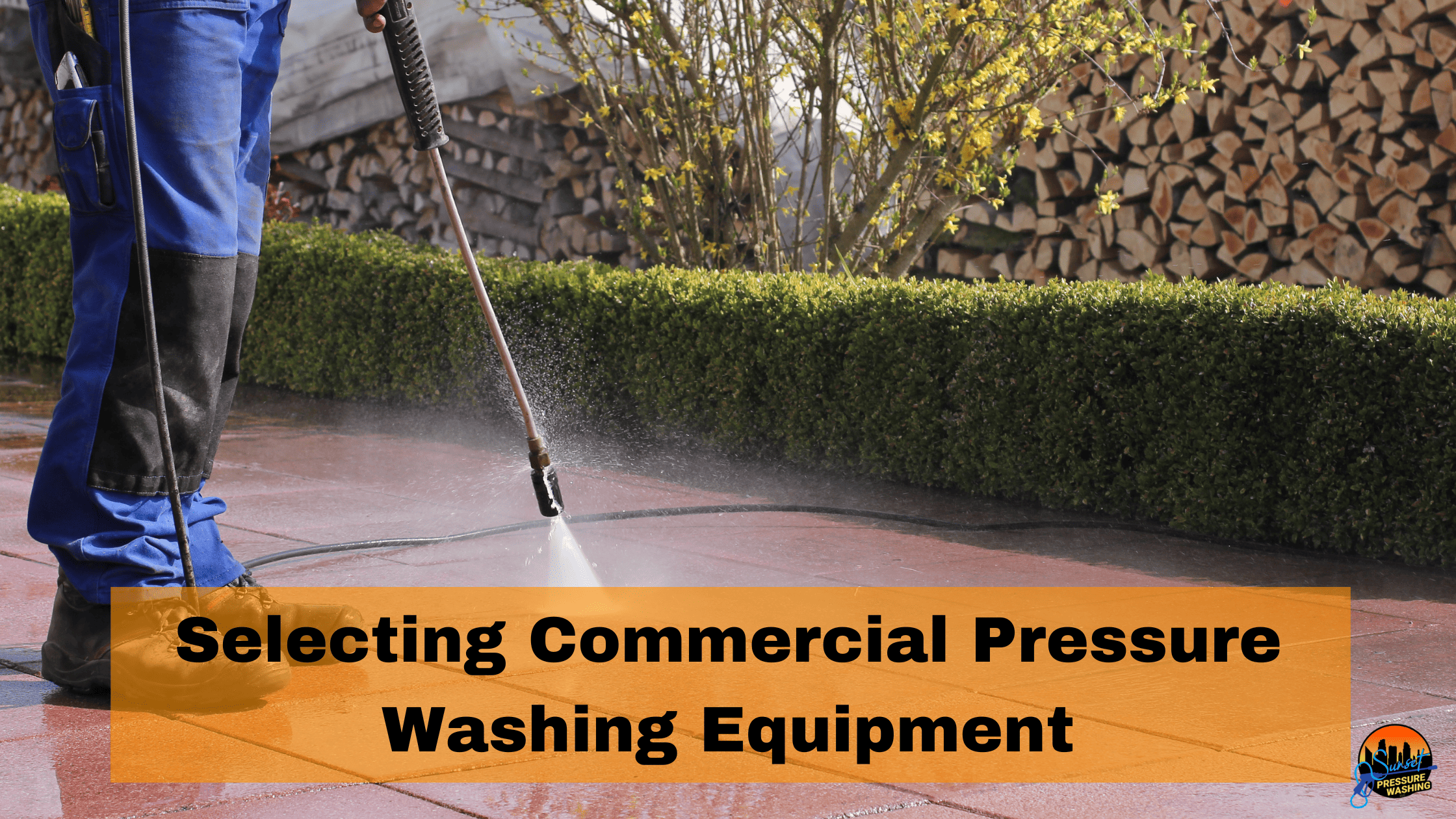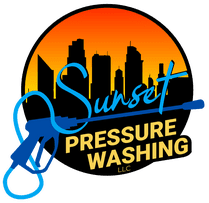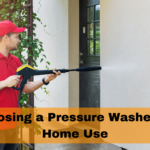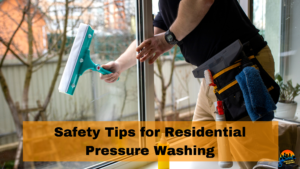
Selecting Commercial Pressure Washing Equipment
When it comes to maintaining the exterior of your business, pressure washing is an essential task. It’s not just about aesthetics; regular cleaning can prolong the life of your building’s surfaces. Selecting the right commercial pressure washing equipment is crucial for effective and efficient cleaning. In this blog, we will guide you through the process of choosing the best equipment for your needs.
Understanding Pressure Washing Needs
Embarking on the journey of selecting the right commercial pressure washing equipment begins with a thorough understanding of your specific cleaning needs. This foundational step is crucial in ensuring that the equipment you choose aligns perfectly with the demands of your business’s exterior maintenance. Here are key factors to consider when understanding your pressure washing needs:
Assessing the Cleaning Area
- Size Matters: The size of the area you need to clean is a primary consideration. Larger spaces may require equipment with higher capacity or mobility to efficiently cover the area.
- Surface Material: Different materials—be it concrete, brick, wood, or metal—react differently to pressure washing. Understanding the delicacy or resilience of your surfaces helps in choosing a pressure washer that won’t cause damage.
Identifying the Type of Dirt and Grime
- Common Contaminants: Regular dirt, dust, and mud require a basic level of pressure washing.
- Stubborn Stains: Oil, grease, or graffiti demand more powerful equipment with higher pressure settings or even hot water capabilities.
- Frequency of Cleaning: If the area hasn’t been cleaned in a while, you might need a more robust machine to tackle accumulated grime.
Frequency and Duration of Use
- Regular Maintenance vs. Occasional Use: Determine how often you plan to use the pressure washer. Frequent use might justify investing in a more durable, professional-grade model.
- Short vs. Long Cleaning Sessions: If you anticipate long hours of cleaning at a time, consider a machine that’s designed for extended use without overheating.
Environmental and Regulatory Considerations
- Water Conservation: In areas where water usage is a concern, opt for a pressure washer with a high efficiency in water usage.
- Noise Regulations: Some regions have strict noise regulations, which might influence your choice between electric (quieter) and gas-powered (louder) models.
End-Goal of Cleaning
- Basic Cleaning vs. Deep Cleaning: Understand whether your primary goal is to maintain a basic level of cleanliness or to perform deep cleaning. This affects the power and type of washer needed.
- Preparation for Painting or Treatment: If pressure washing is a preparatory step for further treatment like painting, you’ll need a machine that can effectively strip surfaces without damage.
Types of Pressure Washers
Choosing the right type of pressure washer is critical for efficient and effective cleaning. There are various models available, each suited for different needs and environments. Here’s an overview of the most common types of pressure washers and their respective features:
Electric Pressure Washers
- Power Source: These washers are powered by electricity and are generally lighter and quieter than gas-powered models. They are ideal for indoor use or in areas where noise is a concern.
- Maintenance: Electric pressure washers require less maintenance compared to gas models. There’s no need to refuel or manage oil changes.
- Mobility: These are often more compact and easier to move around, but their range is limited by the length of the power cord.
- Application: Best for smaller, more frequent tasks like cleaning vehicles, small patios, and outdoor furniture.
Gas-Powered Pressure Washers
- Power Source: These models run on gasoline and are more powerful than their electric counterparts. They can handle tougher, more stubborn stains and larger areas.
- Maintenance: Gas-powered washers require regular maintenance, including fuel management and engine care.
- Mobility: With no cords to tether them, they offer greater mobility and are suitable for large, outdoor spaces.
- Application: Ideal for commercial use, large-scale cleaning projects, stripping tough grime, and preparing surfaces for painting.
Diesel-Powered Pressure Washers
- Power Source: These washers are powered by diesel and are known for their durability and high performance.
- Heavy-Duty Use: They are designed for heavy-duty, industrial applications and can operate for longer periods without overheating.
- Mobility and Noise: While they offer good mobility, they are louder and emit fumes, making them unsuitable for indoor use.
- Application: Perfect for construction sites, industrial cleaning, and other heavy-duty tasks.
Hot Water Pressure Washers
- Temperature Feature: These washers use heated water, making them more effective at breaking down oil, grease, and other tough substances.
- Power Source: They can be powered by electricity, gas, or diesel, with the heating element typically powered by electricity or diesel.
- Application: Ideal for industrial and agricultural use, especially where grease, oil, or heavy soiling is involved.
Cold Water Pressure Washers
- Temperature Feature: These models use cold water and rely solely on the pressure of the water for cleaning.
- Versatility: They are versatile and can be found in electric, gas, or diesel-powered models.
- Application: Suitable for general cleaning tasks, such as washing cars, decks, and siding.
Specialized Pressure Washers
- Variants: There are also specialized pressure washers for specific tasks, like ultra-high-pressure washers for extremely tough grime, or soft wash systems for delicate surfaces.
- Application: These are used for very specific cleaning needs and require more expertise to operate safely.
Pressure and Flow Rates
When selecting a commercial pressure washer, understanding the significance of pressure and flow rates is essential. These two factors determine the efficiency and effectiveness of your cleaning. Let’s break down what they mean and how they impact your pressure washing tasks.
Understanding PSI: Pressure Strength
- PSI (Pounds per Square Inch): This measures the pressure exerted by the water. It’s a key factor in determining the washer’s ability to break down and remove dirt and grime.
- High PSI: A higher PSI rating means more power. This is crucial for removing tough stains, such as oil stains on concrete or heavy mildew.
- Low PSI: A lower PSI is suitable for more delicate surfaces where a high-pressure stream could cause damage, like wood decks or old masonry.
Assessing GPM: Water Flow Rate
- GPM (Gallons Per Minute): This measures the flow rate of water coming out of the pressure washer. It indicates how quickly the washer can clean a surface.
- High GPM: A higher GPM can cover larger areas more quickly, making it ideal for extensive commercial spaces.
- Efficiency: GPM plays a significant role in the cleaning process efficiency, as more water means faster rinsing and larger area coverage.
Balancing PSI and GPM
- Finding the Right Combination: The perfect balance between PSI and GPM depends on your specific cleaning requirements. A unit with high PSI and low GPM might be powerful, but slow in cleaning large areas. Conversely, a high GPM with low PSI can clean large areas fast but may struggle with tough stains.
- Unit Measurement – Cleaning Units (CU): This is calculated by multiplying PSI by GPM. It’s a useful measure to compare the overall effectiveness of different pressure washers.
Application-Specific Considerations
- Surface Material and Condition: Fragile surfaces require lower PSI to avoid damage. Tough surfaces can handle high PSI for effective cleaning.
- Type of Dirt: Sticky or greasy substances might need a pressure washer with a higher PSI, while regular dirt or mud can be cleaned with a lower PSI.
- Area Size: Larger areas benefit from a higher GPM for efficiency, while smaller areas can be managed with a lower GPM.
Professional Advice
Consulting Experts: If you’re unsure about the best PSI and GPM for your needs, consulting with a pressure washing professional or equipment specialist can provide valuable guidance.
Hot Water vs. Cold Water Pressure Washers
When it comes to commercial pressure washing, the debate between using hot water and cold water pressure washers is a pivotal one. Each type has distinct advantages and is suitable for different cleaning tasks. Understanding their differences will help you make an informed decision based on your specific cleaning requirements.
Hot Water Pressure Washers
Advantages
- Effective in Removing Grease and Oil: Hot water breaks down grease and oil much faster and more effectively than cold water. This makes hot water washers ideal for industrial or automotive environments where oil and grease are common.
- Sanitization: The hot water not only cleans but also sanitizes surfaces, killing bacteria and mold. This is particularly beneficial in food service or medical settings.
- Less Detergent Required: Due to its effectiveness in breaking down substances, you often need less detergent, which can save on cleaning costs over time.
Considerations
- Higher Cost: Hot water pressure washers generally have a higher upfront cost than their cold water counterparts.
- More Complex Maintenance: They can be more complex to maintain due to their heating components.
- Energy Use: They consume more energy, primarily due to the heating element.
Cold Water Pressure Washers
Advantages
- Cost-Effective: Generally, cold water pressure washers are less expensive to purchase and maintain.
- Simplicity and Durability: They are simpler in design, often making them more durable and easier to repair.
- Versatility: Cold water washers are suitable for a wide range of common cleaning tasks, such as removing dirt, mud, and sand.
Considerations
- Less Effective on Oily Stains: Cold water is less effective at breaking down oil and grease, requiring more time and detergent to achieve similar results.
- No Sanitizing Effect: Unlike hot water, cold water doesn’t sanitize surfaces.
Making the Right Choice
Assess Your Needs
- Nature of the Dirt: If you’re dealing with oil, grease, or need a sanitizing effect, hot water pressure washers are the better choice. For general dirt and debris, cold water washers are adequate.
- Cleaning Environment: Consider where you’ll be cleaning. Indoor environments might benefit more from hot water pressure washers for their sanitizing abilities.
Cost vs. Benefit Analysis
- Initial Investment: Hot water washers are more expensive initially, but the benefits might outweigh the costs if they meet your specific needs.
- Ongoing Costs: Factor in the ongoing costs of energy and maintenance, especially for hot water models.
Safety Considerations
Hot Water Safety: Ensure your team is trained in handling hot water pressure washers safely, as the hot water can pose a burn risk.
Nozzles and Attachments
In the realm of commercial pressure washing, the variety of nozzles and attachments available can significantly enhance the functionality and versatility of your equipment. Choosing the right ones is essential for optimizing your cleaning efficiency and effectiveness. Here’s a guide to understanding and selecting the appropriate nozzles and attachments for your pressure washer.
Understanding Nozzle Types
Standard Nozzle Types
- 0-Degree (Red Nozzle): Provides a very concentrated, high-pressure spray. It’s ideal for tough stains and hard-to-reach areas but should be used cautiously to avoid surface damage.
- 15-Degree (Yellow Nozzle): Offers a slightly wider spray, good for heavy-duty cleaning on hard surfaces like concrete.
- 25-Degree (Green Nozzle): A general-purpose nozzle suitable for a broad range of cleaning tasks, from walls to walkways.
- 40-Degree (White Nozzle): Provides a wider, softer spray for delicate surfaces like windows or vehicles.
- 65-Degree (Black Nozzle): Used for applying detergents and cleaning solutions, as it produces a low-pressure spray.
Specialized Nozzles
- Turbo Nozzle: Combines the power of a 0-degree nozzle with the coverage of a 25-degree nozzle, spinning a zero-degree spray in a circular pattern. It’s great for tough grime over larger areas.
- Adjustable Nozzles: Allow the user to adjust the spray pattern on the go, offering versatility without the need to change nozzles.
Essential Attachments
Surface Cleaners
- Description: A flat, circular attachment that evenly distributes pressure across a wider area.
- Use: Ideal for cleaning large flat surfaces like driveways, patios, and parking lots efficiently.
Extension Wands
- Description: Long wands that help reach high or difficult-to-reach areas.
- Use: Useful for cleaning tall buildings, gutters, and roofs safely from the ground.
Foam Cannons
- Description: Attachments that mix detergent with water to create a foamy spray.
- Use: Great for pre-treating surfaces with cleaning solutions, especially in automotive cleaning.
Brush Attachments
- Description: Brushes that attach to the nozzle, providing a soft scrubbing action.
- Use: Perfect for more delicate surfaces where a softer touch is needed, like windows or painted surfaces.
Selecting the Right Accessories
- Assess Cleaning Tasks: Your selection should align with the types of cleaning tasks you commonly undertake. For tough stains, turbo nozzles might be ideal, whereas surface cleaners are better for large, flat areas.
- Material Compatibility: Ensure the attachments are compatible with the surfaces you’re cleaning to avoid damage.
- Quality and Durability: Invest in high-quality, durable attachments that can withstand the demands of commercial use.
Safety and Efficiency
- Proper Usage: Learn how to properly use each attachment to ensure safety and maximize cleaning efficiency.
- Maintenance: Regularly check and maintain your nozzles and attachments for optimal performance and longevity.
Portability and Ease of Use
When it comes to commercial pressure washing, the portability and ease of use of your equipment can greatly affect efficiency and productivity. Whether you’re cleaning large commercial spaces or handling varied locations, having equipment that is easy to maneuver and operate is essential. Here’s what to consider when evaluating the portability and user-friendliness of pressure washers.
Assessing Portability
Weight and Size
- Compact Design: Look for pressure washers with a compact design for easy storage and transportation.
- Weight Considerations: Heavier models may be more powerful but can be difficult to move. Consider the balance between power and portability.
Mobility Features
- Wheels: Ensure the pressure washer has sturdy, high-quality wheels for smooth movement over different terrains.
- Handle Design: Adjustable or foldable handles can enhance maneuverability and comfort during transport.
Transportability
Vehicle Compatibility: If you need to transport the washer between locations, consider its compatibility with your vehicle. It should be easy to load and unload.
Evaluating Ease of Use
User-Friendly Controls
- Intuitive Design: Controls should be straightforward and easy to understand, even for someone using the equipment for the first time.
- Control Accessibility: Controls need to be easily accessible during operation for efficiency and safety.
Start-Up Process
Easy Start: Look for models with an easy start feature, especially in gas-powered washers, to reduce effort and time during startup.
Maintenance Accessibility
Easy to Maintain: The simpler the maintenance, the more user-friendly the machine. Quick-connect fittings, easily accessible filters, and simple pump designs are features to look for.
Ergonomic Design
Comfortable Operation: Features like vibration reduction, comfortable grip handles, and ergonomically designed triggers can reduce operator fatigue, especially during extended use.
Additional Convenience Features
Storage Solutions
On-Board Storage: Built-in compartments for nozzles, hoses, and other accessories keep everything organized and easily accessible.
Hose Management
Hose Reels: A built-in or attachable hose reel can make hose management much simpler, reducing tangles and simplifying setup and pack away.
Detergent Injection Systems
Detergent Tanks: Integrated detergent tanks with easy-to-use injection systems can streamline the cleaning process.
Durability and Maintenance
In commercial pressure washing, the durability and maintenance of the equipment are as crucial as its cleaning capabilities. Investing in a durable machine and maintaining it properly ensures longevity, consistent performance, and safety. Here are key aspects to consider regarding the durability and maintenance of commercial pressure washers.
Durability Factors
Construction Quality
- Material Robustness: Look for washers made with high-quality materials. Stainless steel and brass components, for instance, offer greater durability than plastic.
- Solid Construction: A well-constructed pressure washer can withstand the rigors of frequent commercial use.
Design for Commercial Use
- Commercial-Grade Components: Ensure that the washer is designed for commercial use, which typically includes more durable pumps, engines, and other components.
- Protection Features: Features like thermal protection and robust framing can protect the machine from wear and tear.
Weather and Corrosion Resistance
- Rust Resistance: Given that pressure washers often deal with water and chemicals, corrosion resistance is important to prolong their lifespan.
- Weatherproofing: If the equipment will be used or stored outdoors, ensure it is capable of withstanding various weather conditions.
Maintenance Aspects
Regular Maintenance Checks
- Routine Inspections: Regularly inspect hoses, nozzles, and seals for wear and tear. Checking for leaks or damages in the pump and engine is also crucial.
- Scheduled Servicing: Adhering to a scheduled servicing routine can prevent major breakdowns and prolong the life of the washer.
Ease of Maintenance
- Accessible Design: A pressure washer designed with ease of maintenance in mind will have easily accessible parts for cleaning and repairs.
- Simplified Parts Replacement: The ability to quickly and easily replace worn or broken parts without specialized tools or extensive disassembly is important.
Availability of Parts and Service
- Parts Availability: Choose a brand or model with readily available replacement parts.
- Service Network: Ensure that there is a reliable service network or a trustworthy technician who can service and repair the model you choose.
User Training and Handling
- Proper Usage Training: Instruct users on the proper operation of the equipment to prevent mishandling, which can lead to premature wear.
- Safe Storage Practices: Storing the equipment properly when not in use protects it from environmental factors and accidental damage.
Investing in Quality
- Quality vs. Cost: While higher-quality models may come with a higher price tag, their durability can offer better value in the long term.
- Warranty and Support: Consider the warranty and customer support offered by the manufacturer, which can be indicative of the quality and reliability of the product.
Safety Features
Safety is paramount in commercial pressure washing, given the high pressures and volumes of water involved. Ensuring that your pressure washing equipment has essential safety features not only protects the operator but also extends the lifespan of the machine. Here’s a rundown of crucial safety features to consider in commercial pressure washers.
Essential Safety Features
Pressure Relief Valves
- Function: These valves prevent the pressure from building up to dangerous levels within the pressure washer.
- Benefit: They are critical for preventing hose or pump damage and ensuring the safety of the operator.
Thermal Relief
- Function: This feature helps to cool down the water in the pump system if it becomes too hot, which can happen when the trigger is not being pulled for an extended period.
- Benefit: Prevents the pump from overheating and reduces the risk of wear or failure.
Ground-Fault Circuit Interrupter (GFCI)
- Function: For electric pressure washers, a GFCI plug is essential. It cuts off power immediately if there’s a short circuit, reducing the risk of electric shock.
- Benefit: Provides essential electrical safety, particularly in wet conditions.
Safety Locks on Triggers
- Function: Safety locks prevent the trigger from being accidentally engaged.
- Benefit: This feature is particularly important in preventing unintentional operation that could lead to injury or property damage.
High-Quality Hoses and Connections
- Construction: Hoses and connections should be robust and able to withstand high pressures.
- Benefit: Reduces the likelihood of bursts or leaks, which can be dangerous and damaging.
Anti-Vibration Technology
- Function: Reduces the vibration of the machine during operation.
- Benefit: Decreases operator fatigue and minimizes the risk of repetitive strain injuries.
Operator Safety Considerations
Personal Protective Equipment (PPE)
- Essentials: Operators should wear protective eyewear, gloves, ear protection (especially for gas-powered models), and non-slip shoes.
- Benefit: PPE protects against common hazards such as flying debris, high-pressure water streams, and noise.
Proper Training
- Importance: Ensuring operators are properly trained in the use of pressure washers, understanding the controls, safety features, and correct operation procedures.
- Benefit: Knowledgeable use of equipment greatly reduces the risk of accidents.
Safe Operation Practices
- Awareness: Operators should always be aware of their surroundings, particularly the presence of other people, to avoid accidents.
- Techniques: Understanding the correct techniques for various cleaning tasks also contributes to safety.
Maintenance and Inspections
- Regular Check-Ups: Frequent inspections of the equipment for any signs of wear or malfunction.
- Maintenance: Timely maintenance ensures that all safety features are functioning correctly.
Budget Considerations
When investing in commercial pressure washing equipment, budget considerations play a crucial role. It’s important to balance the cost with the features and quality you need for effective and efficient cleaning. Here’s how to navigate budget considerations while ensuring you get the most value from your purchase.
Initial Purchase Cost
Understanding Price Ranges
- Variety of Models: Pressure washers come in a wide range of prices, depending on their features, power, and durability.
- Entry-Level vs. Professional Grade: Entry-level models are cheaper but might not withstand frequent commercial use, while professional-grade models are more expensive but offer durability and efficiency.
Assessing Needs vs. Cost
Tailoring to Your Requirements: Align the features you need (such as PSI, GPM, hot vs. cold water) with your budget. Avoid paying for extra features that you may not use.
Long-Term Value
Durability and Longevity
- Investment in Quality: Sometimes, investing more upfront in a higher-quality machine can save money in the long run due to its longer lifespan and reduced repair costs.
- Warranty and Service: Consider the warranty and the manufacturer’s customer service reputation, as these can add value and reduce long-term costs.
Operating Costs
- Fuel Efficiency: For gas-powered models, fuel efficiency is a key consideration in ongoing costs.
- Maintenance Costs: Factor in the ease and cost of maintenance, including the availability and cost of replacement parts.
Return on Investment (ROI)
- Productivity Gains: A more efficient machine can complete tasks quicker and to a higher standard, potentially offering a better ROI.
- Reduced Labor Costs: Equipment that is easier and quicker to use can also reduce labor costs over time.
Financing Options
- Leasing vs. Buying: Leasing equipment can be a good option if upfront capital is limited, though it may be more costly in the long run.
- Payment Plans: Some suppliers offer payment plans to spread the cost over time, making higher-end models more accessible.
Cost vs. Quality Trade-Off
Balancing Act: Striking a balance between affordability and quality is key. It’s crucial not to sacrifice essential features and durability for the sake of a lower price.
Evaluating Total Cost of Ownership (TCO)
TCO Analysis: Consider not just the purchase price but the total cost of ownership, which includes maintenance, repairs, fuel, and any additional accessories over the equipment’s lifespan.
Brand Reputation and Reviews
When investing in commercial pressure washing equipment, considering the brand’s reputation and customer reviews is as important as evaluating the technical specifications. A reputable brand can often guarantee quality, reliability, and customer satisfaction. Here’s how to navigate brand reputation and reviews to make an informed decision.
Importance of Brand Reputation
Trust and Reliability
- Established Quality: Well-known brands have often built a reputation based on the consistent quality of their products.
- After-Sales Service: A reputable brand usually offers better customer service, including accessible technical support and warranty services.
Longevity and Industry Standing
- Test of Time: Brands that have been in the market for a long time are likely to offer products that are tried and tested.
- Industry Recognition: Look for brands that are recognized or awarded within the industry, as this can be a testament to their commitment to quality.
Navigating Customer Reviews
Understanding User Experience
- Real-World Insights: Customer reviews provide insights into how the equipment performs in real-world scenarios.
- Common Issues: Reviews can highlight any common problems or issues users have encountered, which might not be evident in the product description.
Balancing Reviews
- Variety of Sources: Check reviews from various sources, including online retail sites, forums, and independent review sites, to get a well-rounded view.
- Quantity vs. Quality: While a large number of reviews can be a good indicator, pay attention to the quality and specifics of the feedback.
Evaluating Professional Opinions
Expert Reviews
- In-Depth Analysis: Look for reviews by industry experts or professional bodies, as they often provide more detailed and technical evaluations.
- Comparative Studies: Some expert reviews compare different models and brands, which can help in understanding how a particular brand stacks up against competitors.
Considering Peer Feedback
Forums and User Groups
- Community Insights: Online forums and user groups can be a valuable source of information, offering unbiased user experiences and advice.
- Networking: Engaging with peers can provide practical tips and recommendations based on hands-on use in similar commercial settings.
Monitoring Social Proof
Testimonials and Case Studies
- Success Stories: Testimonials and case studies, often found on the brand’s website, can provide examples of the equipment’s effectiveness in various scenarios.
- Business Credibility: Positive feedback from other businesses, especially those in similar industries, can be a strong indicator of a product’s reliability.
The Role of Professional Services
As we’ve explored the various aspects of selecting commercial pressure washing equipment, it’s clear that the decision involves balancing factors like functionality, budget, safety, and maintenance. However, for many businesses, the investment in time and resources to manage this equipment may not align with their core operations or expertise. This is where the value of professional pressure washing services becomes evident.
Professional commercial pressure washing services, offered by Sunset Pressure Wash, provide not only the equipment but also the expertise and manpower to handle any cleaning task effectively and efficiently. By opting for professional services, businesses can ensure high-quality results without the need to invest in and maintain complex equipment. Moreover, professional teams are trained to handle various cleaning scenarios safely and are well-versed in environmental and regulatory compliance, which adds another layer of convenience and assurance for businesses.
Understanding and choosing the right pressure washing equipment is crucial, leveraging professional services can be a more practical and efficient solution for many businesses. If you’re looking for expert pressure washing services that deliver exceptional results with minimal hassle, consider reaching out to Sunset Pressure Wash. Our team of professionals is equipped to handle all your commercial pressure washing needs, ensuring your business maintains a pristine and professional appearance. Visit Sunset Pressure Washing to learn more about our services and how we can benefit your business.






